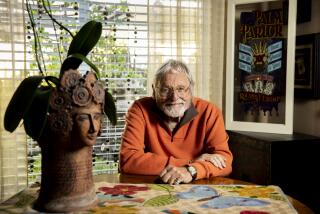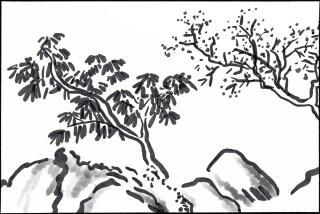A Fanfare for the Common Father...
- Share via
In the olden days, when family life bore the Good Housekeeping Seal of Approval, Dad knew his place. He was wage earner, disciplinarian (“Wait till your father gets home!”), sports authority, the Norman Rockwell figure at the head of the dining table, and a mystery.
“When I was a little kid,” wrote columnist Erma Bombeck, “a father was like the light in the refrigerator. Every house had one, but no one really knew what either of them did once the door was shut.”
The American dad may still be some or all of the above. However, as a survey of magazines in the dentist’s office suggests, today’s dad may also be something of a post-feminist Adam fashioned from the rib of a post-feminist Eve. A whole new concept of fatherhood has emerged: Dad as nurturer and caretaker, Dad as--well, let’s face it--Mom.
These shifting roles are touched on in three new books by three quite dissimilar American male writers.
Leo F. Buscaglia has devoted his life to proselytizing for family affection, show-and-tell style. He learned demonstrative love at the knee (and on the knee) of his father, a poor Italian immigrant whose foreign ways sometimes embarrassed Leo Buscaglia the child. Leo Buscaglia the man remembers, with teary-eyed gratitude, “Papa, My Father.”
Buscaglia tells of Papa the patriot, studying about the Pilgrims (“Some nice-a people, who came, like me and Mama, to America on a boat . . . “); Papa the educator, who insisted that each child bring to the dinner table one newly learned fact to discuss; and, above all, Papa the hands-on father.
Hands-on sometimes meant corporal punishment. Nevertheless, as a passionately involved parent and constant dispenser of hugs and homilies, Papa came close to the modern nurturing dad extolled by Buscaglia in his introduction to “Papa, My Father.”
Buscaglia writes with deliberate bumper-sticker simplicity; he wants his message loud and clear. Only the meanest cynic could fault it. For dads who enjoy their Father’s Day cards adorned with heartfelt verses by disciples of Edgar Guest, consider “Papa, My Father.”
For dads who prefer their pop (and pop) philosophy laced with humor, consider Bill Cosby’s “Love and Marriage.” This latest Cosby offering details his childhood crushes, adolescent embarrassments, disastrous dating, and salvation by Camille, his wife of 25 years.
In real life, as on his television show, Cosby has five children. Not surprisingly, his runaway best seller, “Fatherhood,” did not exhaust his thoughts on that subject. In “Love and Marriage,” Cosby the father inspires almost as many anecdotes as Cosby the hapless suitor or Cosby the happy husband.
Cosby’s TV fans will feel right at home with “Love and Marriage.” His cozy verbal sparring matches with Camille read like gag-laden sitcom routines. His musings have the timing of stand-up comic monologues. His gift is to give a comforting droll validity to our shared everyday anxieties.
“You’re not like me , are you?” Cosby yearns to ask each young man who enters the house to pick up a Cosby daughter. “If you are, then I know what you want and I hope you have the same terrible luck. I hope you find my daughter a cross between Artemis and Eleanor Roosevelt . . .” And he’s off--on a vintage Cosby shtick, one of many, with which most fathers, old or new style, can identify.
While Buscaglia and Cosby purvey the feel-good easy read, M. R. Montgomery gives us, in “Saying Goodbye,” a pain-filled “memoir of two fathers.”
In the 1930s, Montgomery’s father, a civil engineer, helped construct the Fort Peck Dam, a Public Works Administration project in his home state of Montana. As a naval officer in World War II, he helped build military bases in Scotland.
During that same war, Montgomery’s future father-in-law, a Japanese-born Stanford-educated physician, was forced to relocate, give up his practice, and teach Japanese to U.S. Navy recruits. Montgomery, a Boston Globe journalist, looks back with affection at his late father-in-law, who became a beloved physician to the Japanese-American community in San Jose.
With his own uncommunicative and aloof father, Montgomery remained a stranger. After the death of Montgomery senior, the son “was moved to explore . . . to try to make some sense out of his life.” The quest led him to government archives on two continents, and years of research in which he sifted through thousands of documents. He found little to illuminate his father’s role in the building of the Fort Peck Dam or the Scottish naval bases, and even less to illuminate the man himself.
He did, however, unearth a wealth of peripheral information. Like a portrait artist whose subject proves totally elusive, he has substituted a vast landscape, full of foreground and background details, in which the original subject is reduced to a mere speck.
Montgomery’s foreground details include Montanan geology, PWA politics, the nature of Portland cement, the Navy old-boy network, and literally hundreds of other disparate archival tidbits, set against the larger background of the Great Depression, the New Deal, Lend-Lease, and World War II.
The deluge of data sometimes seems about as relevant as the new facts that Papa Buscaglia ordered his children to bring to the dinner table each night. Certainly the details are excessive. Yet Montgomery’s canvas is vast and varied, his hand sensitive and sure. We understand the immediate world in which Montgomery senior moved and something of the outside world that shaped it, and we feel enriched.
What little we learn of the man himself reveals him as rigid, mundane, and a washout as a father. The emotional impact of “Saying Goodbye” lies not in any epiphany concerning the ungiving Montgomery pere . It lies in the touching desperation of the search by Montgomery fils . Somewhere, in that elegantly assembled welter of extraneous information, one hopes the author discovered enough of his father to say a final goodby.
Montgomery believes that the estrangement he describes is not uncommon in American father/child relationships. If he is right then let us give thanks for hug-loving knight-crusader Leo Buscaglia and court jester Bill Cosby, as they sally forth to slay the dragon of uninvolved fatherhood.
More to Read
Sign up for our Book Club newsletter
Get the latest news, events and more from the Los Angeles Times Book Club, and help us get L.A. reading and talking.
You may occasionally receive promotional content from the Los Angeles Times.










